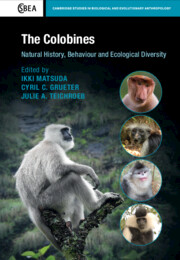Book contents
- The Colobines
- Cambridge Studies in Biological and Evolutionary Anthropology
- The Colobines
- Copyright page
- Contents
- Contributors
- Foreword
- Acknowledgements
- 1 General Introduction
- 2 Taxonomic Classification of Colobine Monkeys
- 3 The Colobine Fossil Record
- 4 Molecular Phylogeny and Phylogeography of Colobines
- 5 Relationships between the Diet and Dentition of Asian Leaf Monkeys
- 6 Morphology and Physiology of Colobine Digestive Tracts
- 7 Colobine Gut Microbiota
- 8 Colobine Nutritional Ecology
- 9 Red Colobus Natural History
- 10 Natural History of Black-and-White Colobus Monkeys
- 11 Behaviour and Ecology of Olive Colobus
- 12 Ecology and Behaviour of Odd-Nosed Colobines
- 13 Ecology of Semnopithecus
- 14 Ecology of Sympatric and Allopatric Presbytis and Trachypithecus Langurs in Sundaland
- 15 Ecology of Trachypithecus spp. in the Indo-Burmese Region
- 16 Socioecology of Asian Colobines
- 17 Socioecology of African Colobines
- 18 Causes and Consequences of the Formation of Multilevel Societies in Colobines
- 19 Colobine Population Ecology
- 20 State of Asian Colobines and Their Conservation Needs
- 21 Conservation of Africa’s Colobine Monkeys (Cercopithecidae, Colobinae) with Taxonomic and Biogeographic Considerations
- 22 Directions for Future Research
- References
- Index
16 - Socioecology of Asian Colobines
Published online by Cambridge University Press: 08 February 2022
- The Colobines
- Cambridge Studies in Biological and Evolutionary Anthropology
- The Colobines
- Copyright page
- Contents
- Contributors
- Foreword
- Acknowledgements
- 1 General Introduction
- 2 Taxonomic Classification of Colobine Monkeys
- 3 The Colobine Fossil Record
- 4 Molecular Phylogeny and Phylogeography of Colobines
- 5 Relationships between the Diet and Dentition of Asian Leaf Monkeys
- 6 Morphology and Physiology of Colobine Digestive Tracts
- 7 Colobine Gut Microbiota
- 8 Colobine Nutritional Ecology
- 9 Red Colobus Natural History
- 10 Natural History of Black-and-White Colobus Monkeys
- 11 Behaviour and Ecology of Olive Colobus
- 12 Ecology and Behaviour of Odd-Nosed Colobines
- 13 Ecology of Semnopithecus
- 14 Ecology of Sympatric and Allopatric Presbytis and Trachypithecus Langurs in Sundaland
- 15 Ecology of Trachypithecus spp. in the Indo-Burmese Region
- 16 Socioecology of Asian Colobines
- 17 Socioecology of African Colobines
- 18 Causes and Consequences of the Formation of Multilevel Societies in Colobines
- 19 Colobine Population Ecology
- 20 State of Asian Colobines and Their Conservation Needs
- 21 Conservation of Africa’s Colobine Monkeys (Cercopithecidae, Colobinae) with Taxonomic and Biogeographic Considerations
- 22 Directions for Future Research
- References
- Index
Summary
For folivores, socio-ecological models predict scramble competition and egalitarian dominance relationships with female dispersal, but female Asian colobines do not all nicely fit these predictions. Alternative explanations concern an absence of competition, and the Folivore Paradox, where group size is limited by social factors such as infanticide. Relevant data are scarce, but our review shows that colobine foraging costs increase with group size, yet female fitness may increase or decrease. Dominance relationships vary from despotic to egalitarian, and are individualistic. The lack of female nepotism in despotic species (or populations) still requires explanation. Female dispersal is found in egalitarian and some despotic species, yet costs may be low if females migrate into a group with familiar females. Asian colobine social organization seems to follow one of two patterns. First, in seasonal species, food limits group size, while infanticide does not; these groups may experience contest competition. Second, in a-seasonal species groups are uni-male, the infanticide risk is high and infanticide, not food, may limit group size. This proposal requires further testing and may also apply to uni-male frugivores. This overview of the socio-ecological patterns in Asian colobines highlights that ecological and social selection pressures in interaction determine primate social organization.
Keywords
- Type
- Chapter
- Information
- The ColobinesNatural History, Behaviour and Ecological Diversity, pp. 250 - 270Publisher: Cambridge University PressPrint publication year: 2022



